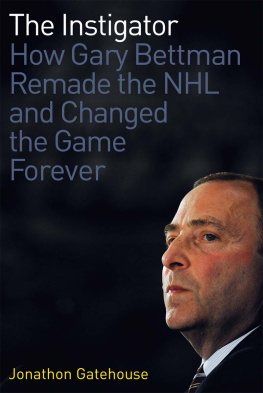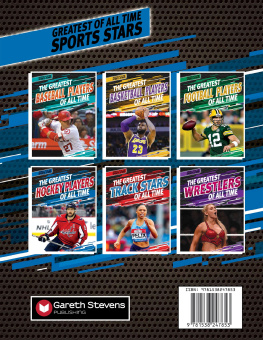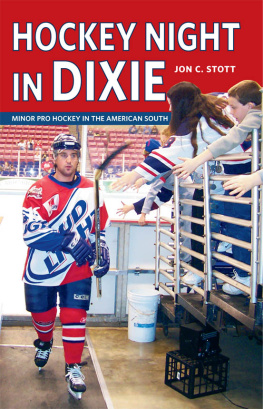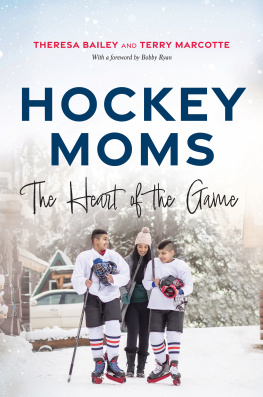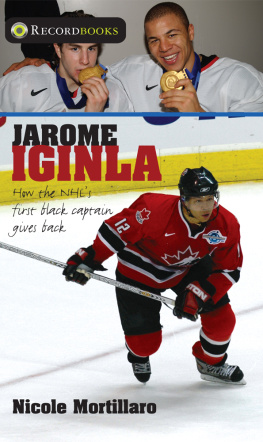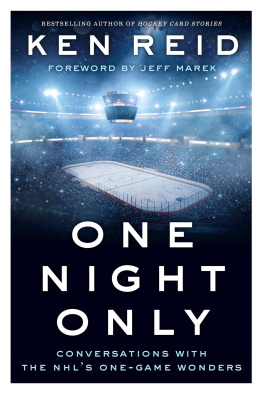

Copyright 2012 by Jonathon Gatehouse
No part of this publication may be reproduced, stored in a retrieval system, or transmitted in any form by any means, electronic, mechanical, photocopying, or otherwise, without the prior written permission of the publisher, Triumph Books LLC, 814 North Franklin Street Chicago, Illinois 60610.
This book is available in quantity at special discounts for your group or organization. For further information, contact:
Triumph Books LLC
814 North Franklin Street
Chicago, Illinois 60610
(312) 337-0747
www.triumphbooks.com
Library of Congress Cataloging-in-Publication Data available on request.
Manufactured in the U.S.A.
ISBN: 978-1-60078-815-4
The NHL creed and the theme song for Canadian NHL expansion are used with permission.
To Andrea,
for pulling me up this mountain
and so many more
Contents
1
Sticks and Stones
The full beer cup arcs from the not-so-cheap seats of Vancouvers Rogers Arena toward the home end of the ice, golden contrail spreading out behind. It lands and splatters, short and a little to the left of the intended target, but close enough that he has to notice. Still, Gary Bettman doesnt flinch. Wireless microphone raised to his lips, tight smile firmly in place, free hand tucked casually in his suit pants pocket, the commissioner of the National Hockey League carries on with the speech that no one in the rink can hear over the cacophony of booing and catcalls. Bostons Tim Thomas skates forward to accept the Conn Smythe Trophy as the 2011 Stanley Cup playoffs most valuable player as the beersand now plastic water bottlescontinue to fly. Theres a polite burst of applause, as the burly goalie grins and poses for photographers. Then, just to make sure things havent been misconstrued, the crowd of 18,860 takes up the chant, Bettman sucks! Bettman sucks!
The sequence is much the same when a pair of white-gloved custodians from the Hockey Hall of Fame carry the Cup onto the ice: clapping for the chalice, some high-decibel abuse for the man giving it away. And the odd missile from the stands. Zdeno Chara, the Bruins towering and glowering captain, doesnt even realize the presentation is underway until Bettman beckons him up to the red carpet. Theres a lopsided exchange, in which the 5-foot-6 commissioner looks like the mayor of Munchkinland next to the 6-foot-9-plus-skates Slovak defenceman. Seconds later, the Bruins are celebrating in a pulsating mob at centre ice, while the whipping boy ducks back down the tunnel, surrounded by NHL security.
Afterwards, the commissioner will pretend it was no big deal, chalking up the hostile reception to the Game 7 disappointment of Canucks fans, which was compounded by having to watch a despised opponent celebrate on their own turf. But home or away, the reaction has long been the same. In a sport that prides itself on its rituals, the jeering of the Bettman has become an annual rite of spring, as predictable as undisclosed injuries and bushy playoff beards.
In June 1993, just a few months into the job, he got a pass from fans in Montreal when the Habs beat Wayne Gretzky and the Los Angeles Kings in five with the help of the ghosts at the storied Forum. (How else does one explain the teams ten consecutive overtime wins over four rounds?) And the relief felt in New York the next year when the Rangers finally secured the Cup, ending a fifty-four-year drought with a see-saw Game 7 victory over the Canucks, made the habitually harsh Madison Square Garden atmosphere positively giddyMark Messier hoisting Stanley to the strains of Tina Turners Simply the Best and Iron Mike Keenan doling out hugs.
But in the wake of a lockout that held the sport hostage for 103 days, there was little respect left for authority at the Meadowlands when the New Jersey Devils trapped their way to a sweep of the Detroit Red Wings in June 1995. The league was in transition. The Quebec Nordiques were already on their way to Denver. The future of the Winnipeg Jets hung in the balance. The LA Kings, laid low by the fiscal implosion and arrest of Bruce McNall, had declared bankruptcy. And even the team Bettman was about to crown Stanley Cup champions was threatening to bolt to greener pastures in Nashville. The problem was a familiar onebuilding envy. John McMullen, the Devils owner, had moved the Rockies from Colorado to his native New Jersey in 1982 to take advantage of a shiny new 20,000-seat rink that was begging for tenants. But fourteen years later, Brendan Byrne Arenabetter known as the Meadowlandswas no longer so attractive. With only twenty-nine luxury boxes, it paled in comparison to the just-opened United Center in Chicago with its 219 suites, or the 104 corporate lodges planned for Bostons rapidly rising new rink. Claiming his team had lost $20 million and was on track to bleed $2 million more, even as they played to packed houses while on the march to the finals, McMullen was demanding that the New Jersey Sports & Exposition Authority sweeten his lease and pay for extensive renovationsor else.
Bettman disagreed with those who called such tactics blackmail. And he delivered the same message he had been peddling to governments in Quebec, Manitoba, and Hartford, Connecticut: Those who wanted to keep their NHL teams into the next century had better find a way to house them appropriately. Then, during the finals, the commissioner went further, giving an interview in which he underlined the Devils tenuous position as the third representative of the fourth most popular pro sport in the crowded New York market. But it was his pointed refusal to rule out a quick off-season relocation that really had people up in arms. The New Jersey Record gave its editorial page over to a snarky open letter, suggesting the NHL recruit Atlas Van Lines as a corporate sponsor and painting its boss as yet another out-of-touch New York suit. For the sake of the leagues stability, you should keep hockey clubs from picking up stakes whenever they smell a fresh greenback, lectured the paper. And at the rink the placards the fans were waving were even more cutting: Nashville already has enough people without teeth.
So when Bettman stepped out onto the ice following the Devils championship-clinching 52 victory, the leather-lunged New Jersey crowd let him have it, booing and gesturingthumbs down or middle fingers upas he presented Claude Lemieux with the Conn Smythe Trophy, and again when he handed off the Cup to Devils captain Scott Stevens. And that night, a tradition was born.
Theres no doubt that being a lightning rod for fan discontent is part of the job description for commissioner of a major-league sport. The throng in Philadelphia jeered Bud Selig when he presented the Phillies with the World Series trophy in 2008rather mildly given that football fans in the City of Brotherly Love once infamously booed Santa Claus during an Eagles half-time show. With an NFL lockout on the horizon in 2011, Roger Goodell got the business at the draft in New Yorks Radio City Music Hall, forced to stand uncomfortably at the podium until the invective and chants of We want football! We want football! petered out. David SternBettmans mentor and head of the NBA for twenty-eight years and countingfigures he has been heckled in every city in the league, although Dallas fans seem to bear him particular animosity. Taking the extremely long view, the seventy year old recalls how everyone used to boo Harry Truman when the president was shown in newsreels at the movies. I dont know why, but thats what you did, he says. And I guess I came to believe that if you see the commissioner you boo, tooas the symbol of authority and real or imagined slights and policies you dont like. Even Bettmans half-brother, Jeffrey Pollack, the commissioner of the World Series of Poker for a time, knows what its like to feel the fans wrath: Its an inherently political job, and public opinion will cover a range of positions.
Next page
